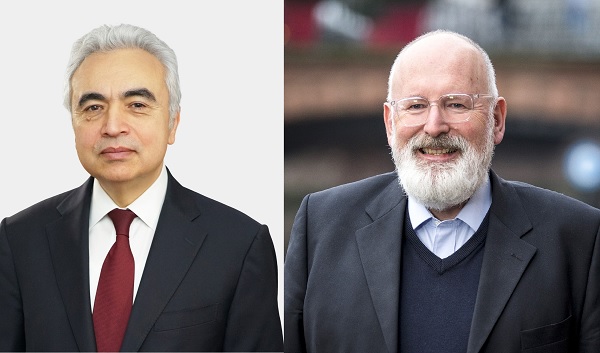
By Frans Timmermans and Fatih Birol;
Across the globe, nearly 800 million people live without any access to electricity – about 600 million of them in Sub-Saharan Africa. In a world of deepening inequalities between the haves and have-nots, this is a glaring injustice. With cheap renewables and green investments following the pandemic, we can make energy poverty history within the next decade. Universal energy access by 2030 is possible, but we need to start making great strides, and soon. The International Energy Agency and the European Commission therefore invite other partners to join us in putting energy access at the centre of cooperation with Africa.
Lack of electricity inhibits those aspects of daily life that many of us take for granted. Electricity powers our economies: we need it in schools, offices, and hospitals, where it now refrigerates life-saving vaccines. We need to expand electricity access on an industrial scale to enable families in Sub-Saharan Africa to aspire to the same standard of living as families in other parts of the world.
Technological progress and an unprecedented drop in the cost of renewables can now deliver the cheapest electricity humanity has ever seen. In the past two decades, the massive global expansion of electricity access was mainly driven by coal plants. But it no longer makes sense to invest in coal. Africa is the world’s premium location to harness solar energy and is already demonstrating that a cleaner path is possible. Between 2014 and 2019, 20 million people a year in Africa got access to electricity for the first time, with much of the growing demand met by increasingly competitive solar and hydropower installations. Harnessing these abundant energy sources on the African continent can help develop local jobs and avoid expensive import bills.
Unfortunately, despite technological progress, the world is not on track to deliver on our global commitment to universal energy access by 2030. The Covid-19 crisis has caused significant setbacks. Without action, this can develop into a lasting negative trend. Last year, the number of people in sub-Saharan Africa without access to electricity grew – for the first time in eight years. Restrictions due to the pandemic have held back work to connect homes, businesses, schools and hospitals, and the global economic downturn has imposed severe constraints on African countries’ budgets. This has significantly limited the scope for African governments to fund clean energy investments and resulted in millions of people being pushed back into extreme poverty, where they can no longer afford basic electricity services.
Barriers to deploying solar and other renewable technologies in Africa include the initial costs of installing them. Solar and wind power plants have the advantage of free energy supplies – the sun and wind – once they’re up and running. But in developing economies, the upfront costs of setting up mini-grids or standalone home solar systems, especially in rural communities, are enormous given the financial resources of those communities.
In addition, companies trying to set up new renewable projects are not always able to guarantee stable revenues from the get-go and face difficulties attracting investors. In general, businesses across developing economies are plagued by far higher borrowing costs than their counterparts in advanced economies, adding an extra hurdle to any renewable project. These difficulties are now exacerbated by the economic damage from the Covid-19 pandemic, which is lasting much longer in many developing economies in Africa and beyond.
The good news is that there are solutions available to address these challenges. They include innovative pay-as-you-go business models to spread out the upfront costs, improved policy and regulatory frameworks to enable more projects to advance, and greater efforts by international and regional organisations to support the development of the sector and bring down the financing costs of renewables projects.
All governments and relevant international organisations must urgently renew our commitment to end energy poverty by 2030, including at the upcoming UN High Level Dialogue on Energy. And we must back that commitment up with stronger action. The European Union and the International Energy Agency are partnering to make clean energy access an integral part of international efforts to reach net-zero emissions. This is how we can tackle uneven energy access without locking in any more harmful fossil fuel emissions. The IEA as well as the European Commission, through its Green Energy Initiative, are putting clean energy access at the heart of our collaboration with African governments. We will work to increase the number of people, businesses and industries in Africa who have access to affordable, modern, and sustainable energy services. In 2021, the European Commission’s Green Energy Initiative is entering a new phase. Once in place, grants, technical assistance, and other financial instruments will support investments in renewable energy generation and promote energy efficiency across Africa.
In the next seven years, 30% of the European Union’s budget for international cooperation will go towards tackling climate change. But public funding alone is not enough. Private sector investments will be key and many European companies are ready to step in. But if we are to succeed in making energy poverty history in Africa, we need the whole world to work in concert: a global end to funding overseas coal power, accelerated cooperation on expanding clean electricity in Africa, as well as scaled-up financial support from advanced economies.
Let’s be clear – clean energy access goes beyond climate action. Renewables are good business and an affordable way to produce electricity. Investing in clean energy is a full-fledged strategy for economic development. We therefore count on other leading economies and organisations to take concrete steps with us to make energy poverty history within the next decade.
